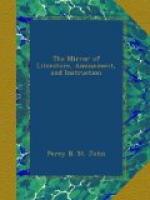This letter also exhibits a specimen of Leicester’s characteristic meanness; for notwithstanding that he was a party to the act of forwarding the warrant for Mary’s death, as his name occurs among those of the council who signed the letters to the Earl of Shrewsbury, the earl marshal, and to the Earl of Kent, both of which were dated on the 3rd of February, 1586-7, commanding them to cause it to be put into execution, he took care to withdraw from court before Elizabeth performed the roll, which has so justly excited the scorn of posterity. It may be also remarked, as another example of the official duplicity of the period, that Sir Francis Walsingham likewise affected not to have been concerned in the affair of dispatching the warrant, as in his letter to Lord Thulstone, the secretary to King James, dated at Greenwich, on the 4th of March, 1586-7, less than a month afterwards, he says, “Being absent from court when the late execution of the queen, your sovereign mother, happened,” though we find that he signed both the letters just mentioned.
G.B.
A Letter from John Woolley, clerk of the Council in the time of Elizabeth, to the Earl of Leicester.
To the Righte Honorable my singular good the Earle of Leycester, one of her Maties Most Honorable Privie Councell.
RYGHTE Honorable and my moste especiall goode Lorde,—It pleased her M’tye yesterday night to call the lord treasurer and other of her councell before her into her withdrawing chamber, where she rebuked us all exceedingly, from our concealing from her our proceeding in the Queen of Scott’s case; but her indignation particularlye lyghteth most upon my lord treasurer and Mr. Davison, who called us togeather, and delivered the commissione, for she protesteth she gave expresse commandement to the contrarye, and therefore hath taken order for the committing of Mr. Secretary Davison to the Tower, iff she contenew in the mynd she was yeterday night, albeit we all kneeled upon our knees to praye her to the contrarye.
I think your lordship happy to be absent from these broiles, and thought it my dewtye to lett you understand them; and so in haste I humblye take my leave.—At the Courte, this present Sunday,[1] 1586.
Your lordship’s ever most bounden,
J. WOOLLEY.
P.S. I have oftentimes sent unto John, your old servante, Mr. Norld, to pray humbly your lordship’s orders for the ordering of his case; he hath been long in prisone, and desireth your lordship’s orders for the hearing of his case, which it may please your lordship to express unto me.—Cottonian MSS. Caligula, c. ix. fol. 168, (Original.)
[1] 12th February, 1586-7.
* * * * *
The Topographer
A VISIT TO STUDLEY PARK AND FOUNTAINS ABBEY, YORKSHIRE.
With a Notice of the Roman Military Road, leading from Aldborough (the Isurium of the Romans,) to the North.




